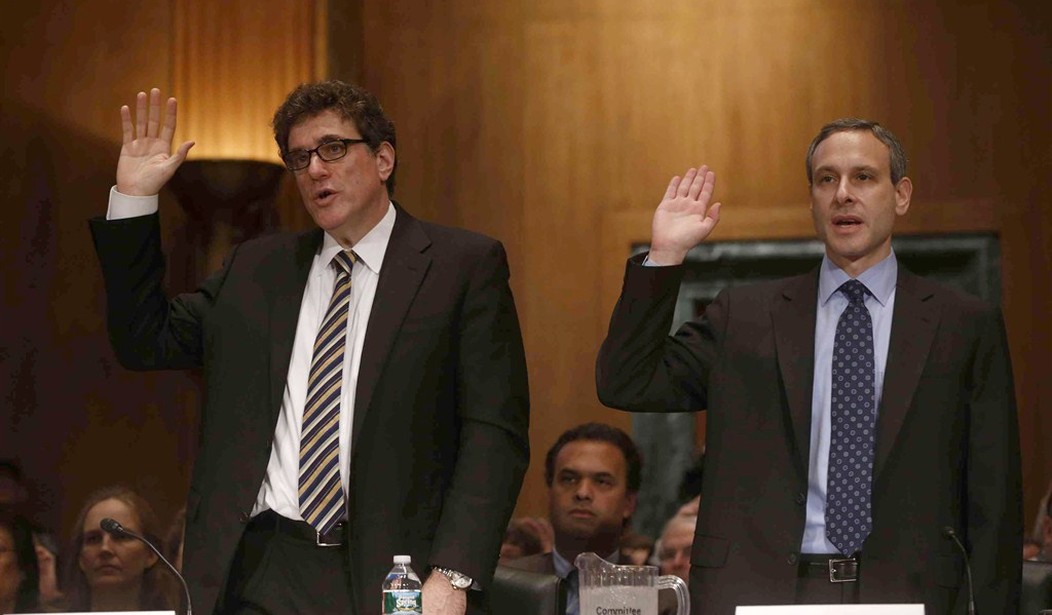One of the bizarre permutations of the ongoing IRS scandal is the manner in which the agency made the story public. As you'll recall, the revelation came
"I'll take responsibility for that...[it] was an incredibly bad idea."
Yeah, it was. It was even a worse idea for Lerner to mislead the public about whether the question was planted (the questioner also initially denied any such arrangement). She was the one who planted it, apparently at Miller's behest. Lerner's lies continue to pile up, yet she somehow still has her job. It's also useful to recall exactly what Miller told House Members on Friday. In response to a line of questioning on this narrow matter, Miller's responses were evasive and couched in passive language. He seemed intent on keeping the provenance of the planted question as hazy as possible. Now that the media noose has tightened on the specifics, Miller apparently felt compelled to admit that it was actually his idea all along -- adding obligatory denunciations of his own brainchild for good measure. It was all just another bout malice-free, foolish incompetence, you see. In his testimony today, Miller again insisted that the widespread targeting program was not the product of partisan bias (cough), but rather arose from a desire to be more "efficient." Allahpundit flayed this talking point yesterday:
Recommended
If the IRS’s big problem circa 2010 was that it was overwhelmed with nonprofit applications (or so the agency falsely claims), why did that lead to unusually onerous demands for information? The typical government response to unmanageable workloads is to cut corners, yet the agency ended up asking Engelbrecht to send them copies of every Facebook post and Tweet that she ever sent, amid hundreds of other questions. That’s odd, no? You would think the big scandal to come out of a glut of tax-exempt petitions is that those petitions were being approved unusually quickly and with little scrutiny. Instead the opposite happened. Go figure.
Basically, the "efficiency" excuse makes no sense because the IRS created more work for itself by pummeling conservative groups with insanely granular, intrusive, and frequently offensive questions and document demands. To recap: Miller told Lerner to plant a question. She did, then pretended she didn't. When that story fell apart, Miller admitted that it had taken place, but danced around questions about who ordered it. When that jig was up, he raised his hand for blame. Both he and his predecessor publicly denied that any targeting was happening, then Miller withheld the truth after he was looped in, even after members of Congress followed-up with additional inquiries. Lerner did the same. But for some reason they expect us to trust them when they tell us there was no partisan motive here, even though they've conceded that no liberal or progressive groups were targeted inappropriately. Media reports and anecdotal evidence bear out the unequal treatment, too. With all that context in place, I'll leave you with Miller's sad-face quotation about public perceptions of the agency he runs -- which he himself said is guilty of "horrible customer service:"
Outgoing IRS commissioner Steven Miller on the perception of the agency after scandal: "It breaks my heart."
— Chris Moody (@Chris_Moody) May 21, 2013
Democrats, meanwhile, are worried that the IRS fiasco may contribute to some major heartache in next year's elections.
UPDATE - The Washington Post reports that senior Treasury figures and top-level White House officials debated on "multiple occasions" how to make the IRS targeting scandal public. As we learned yesterday, the president's chief counsel and chief of staff were informed about the IG's report weeks ago, but claim they never told the president about the gathering storm. Since White House officials consulted on the IRS roll out (Carney confirmed this), did they have a hand in the planted question? The American people aren't quite buying the story that this was all a big mistake and that the administration is telling the truth.
UPDATE II- Politico produces a timeline of the administration ever-shifting story on their knowledge of the IRS scandal. Sounding like a disappointed parent, National Journal's Ron Fournier unloads:
I desperately want to believe Pfeiffer. I’ve known him for years. I like him. He’s never lied to me. But Pfeiffer is part of an institution that has demonstrated an inability and/or unwillingness to tell the full truth about the IRS scandal and a spate of other controversies. The White House can’t be trusted. That depressing conclusion (not unique to the Obama White House, sadly) was driven home Monday when spokesman Jay Carney used his daily briefing to announce that presidential advisers knew more about the IRS scandal a bit sooner than previously disclosed...In politics, as in life, when you constantly change your story, even on small matters, you sow doubt about your credibility and competence. In different ways, each of the so-called Obama scandals revolve around the issue of trust (as I wrote here, here, here, here, and here).
The Washington Post adds: "The new account goes well beyond what officials had said as recently as Sunday, when senior adviser Dan Pfeiffer said in television interviews that the White House did not know the results of the inquiry until the inspector general’s report was released last week. Carney had said previously that Ruemmler was told “only about the fact that the IG was finishing a review” of the IRS’s conduct, and he portrayed it as a “normal sort of heads-up” notification. But Carney said Monday that a member of the White House counsel’s staff learned of the IG report the week of April 16, a week earlier than previously disclosed. He also said Ruemmler had briefed McDonough and other senior aides on the findings."
UPDATE III - Carney is now comparing reporters' questions on the IRS to birtherism. Fabulous.

























Join the conversation as a VIP Member